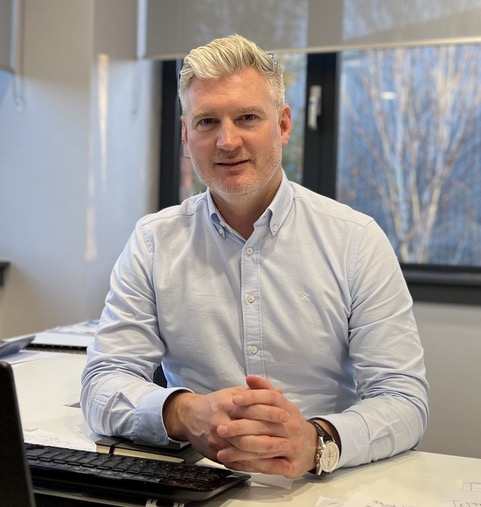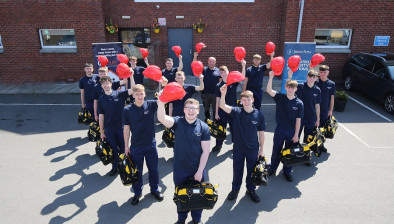Construction Leader: Fraser Lynes on family, football and future planning at Cruden Homes

Fraser Lynes
Still trading and independent after more than 80 years in business, Cruden Group has bucked a trend for many SMEs. Fraser Lynes, managing director of Cruden Homes, speaks to Colin Cardwell about how the company is still adapting to meet today’s challenges.
Recent months have been both busy and encouraging ones for Cruden Group. In October it posted turnover of £132 million and profit before exceptional costs of £2.6m, alongside an increased net asset value of £40.7m, for the year ending 31 March 2024.
The group, which has been in business since 1943, decided last year to restructure its construction business to focus on land-led construction opportunities and partnership working projects, thus reducing its group’s reliance on competitively tendered housing projects.
And with a pipeline of more than 4,500 plots, Cruden believes that this land-led approach will help it deliver more affordable housing as and when funds become available – which now looks more likely given the increasing attention being paid by statutory authorities to the housing emergency.
The company with three offices – Edinburgh’s South Gyle and Cambuslang in Glasgow plus its corporate HQ in Walker Street in the capital’s west end – is still proud to be independent after 81 years.
Fraser Lynes, managing director of Cruden Homes, who has been with the company since he joined as a development surveyor in 2007, notes: “There aren’t that many SMEs who have reached the same age as ourselves”.
He’s right: according to smallbusiness.co.uk most SMEs don’t last for more than five years and recently the construction sector has been the hardest hit, with five-year survival rates falling to just 44%.
Cruden continues to progress though with recent announcements that include plans announced in October to deliver 184 new homes across three new sites in Glasgow and the Scottish Borders including 128 affordable homes and 56 homes for private sale. This was after it had started work on 218 new affordable homes across two developments at Silverlea for the City of Edinburgh Council and Newbyres for Midlothian Council.
While in November, it said that up to 122 new apartments could be created on the site of the former Xcite Livingston leisure pool in West Lothian, plans which could potentially raise up to £3.1m (less deductible costs), which would be reinvested in protecting and improving council services for the local community.
Like all contracting companies, says Mr Lynes, Cruden went through a difficult time post-pandemic as costs and inflation outstripped every other metric. “However, we’re very much still standing and I believe punching above our weight,” he says, adding that Cruden has a staff base of some 250 and 16-18 live outlets across the Central Belt, including the Borders and Fife.
The strategic goal is to be 60/40 weighted toward the private sale market, moving from the 50/50 current balance. He concedes that the sales market remains somewhat depressed because of the impact of interest rates on the mortgage market.
There also remain skills shortages and finance and political issues in terms of the amount of land that is either zoned or coming forward. However, he says: “You get used to these challenges. And every day is exciting for us – when getting people back to work, we’ve been focused on making the environment of the office here one that is inviting, and that people want to come into. That’s hopefully how we’ll maintain and grow our own talent.”
A significant issue, though, remains the shortfall in first-time buyers. “When I was in my 20s, the first thing I wanted to do was buy my own flat, and you’d save up accordingly to do that. It’s something that doesn’t seem to be first in people’s mindsets anymore which has a knock-on effect in all the different areas of the sales market.
“But it’s a mindset that the housing market must try to understand and hopefully, with some government support, we can help to unlock that for young buyers,” he says.
At the other end of the spectrum, The Avenue in Barnton in Edinburgh will cater for homeowners aged 55 years and over, with a mix of styles that includes semi-detached houses, an apartment “club lounge” and a guest suite, with private parking spaces and communal electrical vehicle charging points.
Importantly, says Mr Lynes, this demonstrates his team’s commitment to exceed the industry’s standards for sustainability. “It’s hotel-quality living but above all, it’s sustainable, with a communal ground-source heating solution, a concept that the clients have really grasped.”
This involves, he explains, piles being driven below the surface to a depth of 180 metres allowing heat to rise from the source water far beneath and substantially reduces the cost of heating the homes.
“I think we’re at the forefront of several innovations when it comes to sustainability,” says Mr Lynes. “We’ve already delivered Passivhaus, communal air source heat pumps and district heating.”
All of course vital advances in the sector, given that buildings are calculated to contribute 35% of total global energy consumption.
“The consumer is now wiser and better informed than ever and if we compare ourselves to other industries, while we’re probably not yet at the forefront of ensuring that the customer journey is as good as it can be, through positive customer engagement, giving them the right information and helping them along the way, we can move the industry forward in terms of customer satisfaction.”
Construction is part of Mr Lynes’ personal legacy, and he has various family members who work at both family housebuilding companies and PLCs throughout the country.
“A relative said to me: ‘If it turns out that you’re not good enough as a footballer (and I obviously believed I was going to be good enough) then this would be a good backup.”
The friendly advice proved felicitous. “The Quantity Surveying degree at Edinburgh Napier University was fantastic, it allowed me to get into housebuilding and while there have been challenging days it’s certainly been a great environment to work in,” he says.
From surveying he moved into the land acquisition area, ensuring there was a pipeline of activity for the staff, which pre-pandemic had reached a complement of 600. He then became land development director before assuming the role of managing director. “I joined in 2007 and the time has flown by,” he reflects.
The industry itself has changed hugely during his career thus far. “The customer focus is better now than it has ever been – and our use of technology and software has improved.
“Housebuilding is difficult to revolutionise but there are so many different software packages and improved integration with the supply chain that will make us more efficient, build a better product and deliver a happy customer. The ultimate result is value for money, which is not always necessarily a given in housebuilding.”
He acknowledges that the skills gap has grown since the Covid pandemic but points to a culture at Cruden that focuses on recruiting and retaining the best talent. “To use a football analogy, if you have the best players, you tend to get the best result,” he says.
No prizes then for guessing what Mr Lynes’ interest is outside the office though his active football days “were about two stones lighter ago,” he laughs. “I do some leisurely running and play some golf now but nothing too serious.”
Moving into the 21st century, he says it’s important to give customers access to all the information they require about how their house is being built – beyond just looking at drawings.
“We want to bring people along with us and for them to be genuinely excited about what is the most expensive purchase they will make in their lives – so it’s about us working collaboratively and collectively within each department and coming to the job with a smile on our faces.”





















